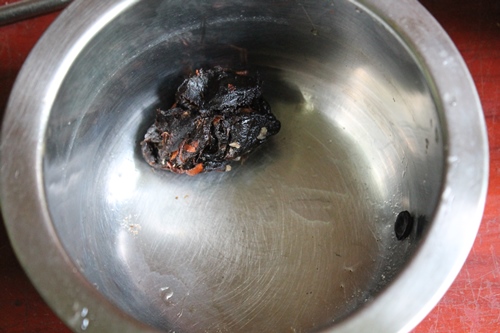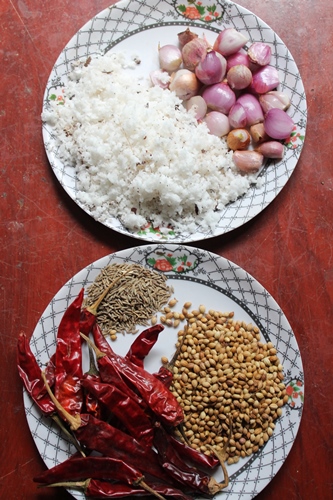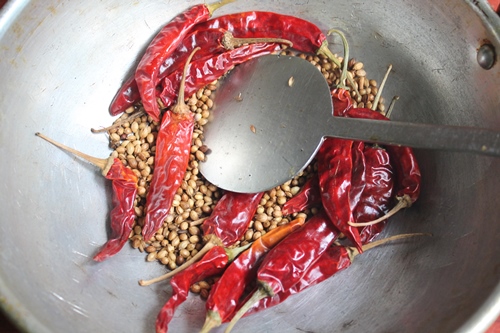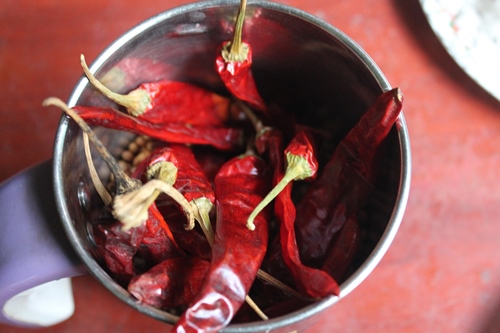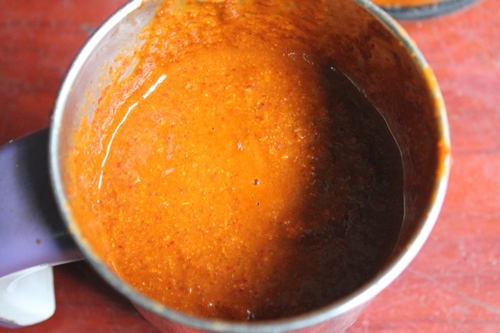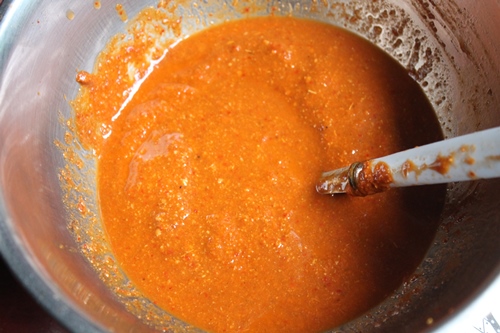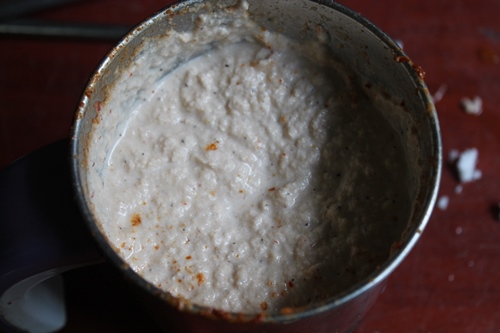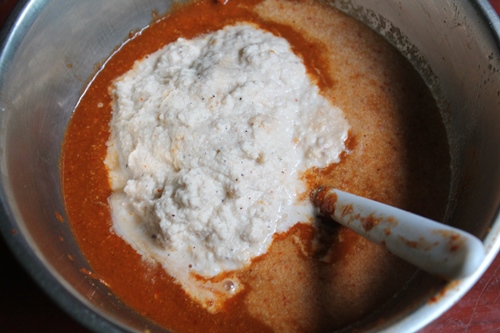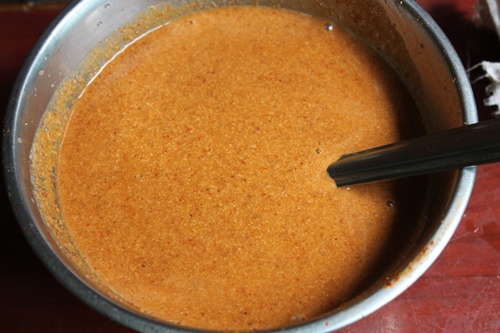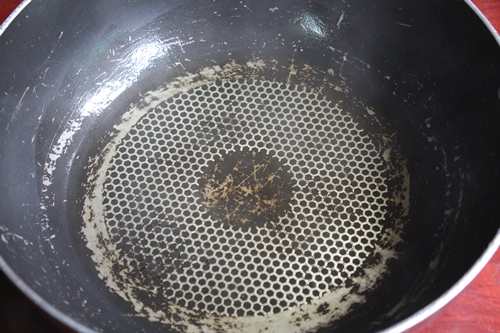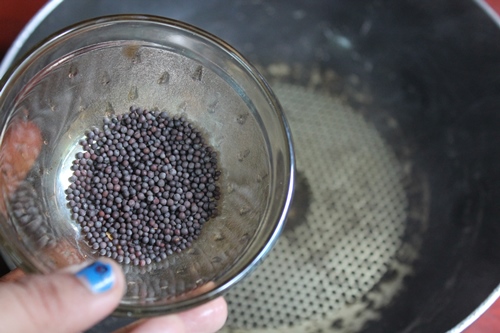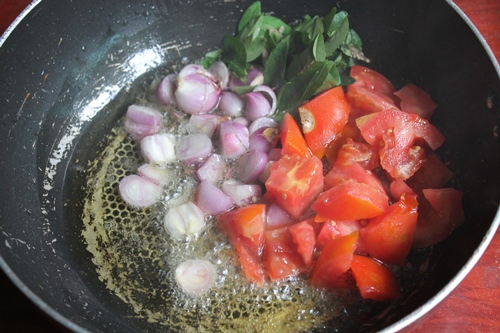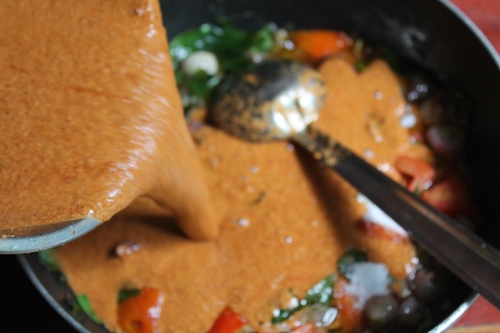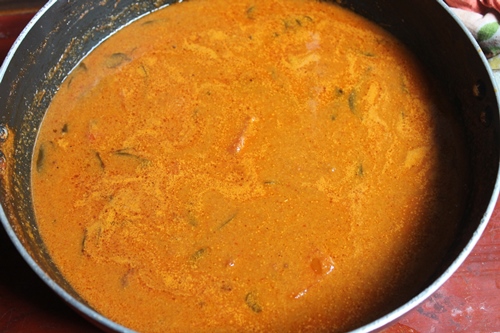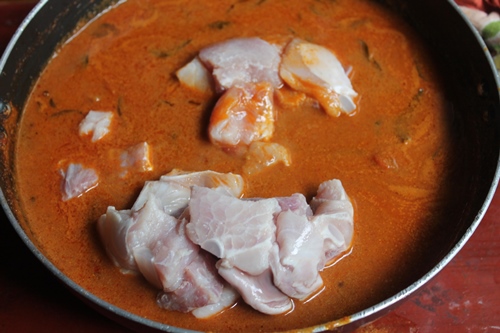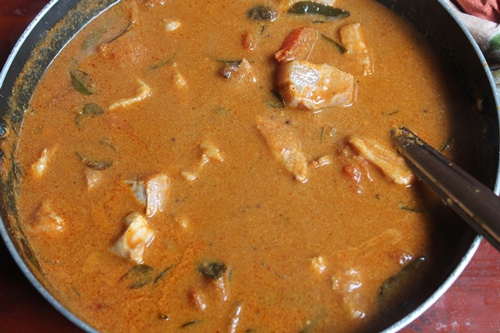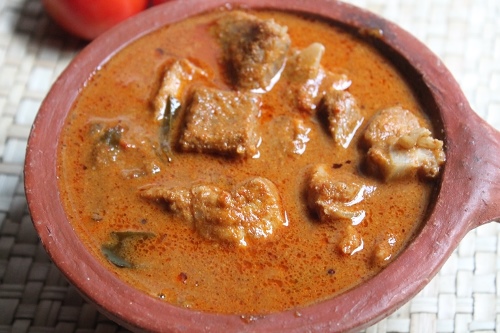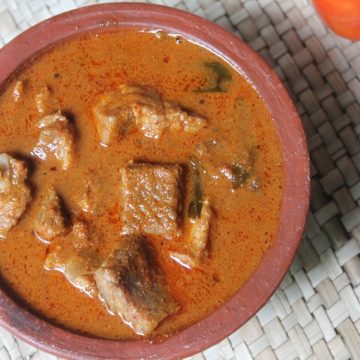
Village fish curry also known as “ Grammathu Meen Kulambu “ is popular in Tamilnadu rural areas. The key to the recipe is cooking them in a mud pot. The recipe is so rustic, spicy and tangy, perfect for idli, dosai and rice or even with ragi mudde. The taste gets even better when you serve it the next day for breakfast.


Village Style Fish Curry
This fish curry has a mixture of roasted ground masala and fresh ground coconut masala which really makes it so yummy.
Jump to:
About Village Fish Curry
Village fish curry is a traditional Tamilnadu style meen kulambu. This flavourful dish is made with fish pieces, cooked with freshly grounded spices and tamarind, flavoured with gingelly oil. You can use any variety of fish of your choice like seer fish (vanjaram), pomfret ( vaval ), red snapper ( sankara ) .
People who have been following me for years may know that I’m from Nagercoil, a Southern coastal region. Living in Nagercoil means you will get fresh catches of fish all day and everyday.
Usually my way of fish kulambu involves tamarind and coconut. This is made using freshly ground spices. If you want to try a really spicy fish kulambu, then check my nellore chepala pulusu recipe.
Similar Recipes
Goan Fish Curry
Anchovies Fish Curry
Sardine Fish Curry
Chettinad Fish Curry
Malabar Fish Curry
Mackerel Fish Curry
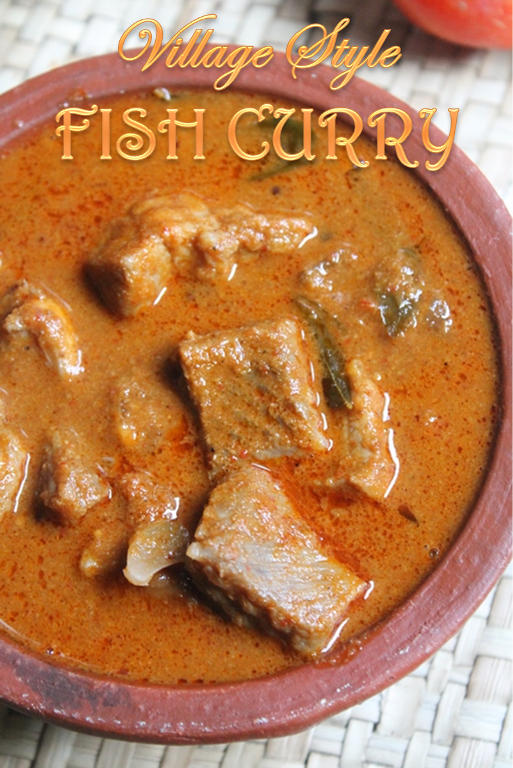

Why This Recipe Works
Versatile : This curry works perfectly with any type of fish like pomfret, seer fish, mackerel, salmon, tuna and barracuda. Making it perfect side curry for breakfast or lunch.
WHY I LOVE THIS RECIPE – My husband is a big fan of seafood. For him, fish curry is the ultimate comfort food especially when served with hot plain rice or Kerala matta rice and along with some spicy fish fry. What I love about this recipe is when you serve the leftover fish kulambu the next day with hot piping idlis, it’s a pure heaven in every bite! Nothing can match this madness of tangy, spicy flavourful fish curry with hot idli.
Nutritional meal : Fish are rich in omega -3 fatty acids and a good source of lean protein. The fresh spices and gingelly oil also contribute some nutritional health benefits like a good source of fatty acids.
Ingredients


Gingelly oil : Gingelly oil or sesame oil is a staple in authentic south Indian recipes. It has a traditional flavor and adds a rich aroma to the curry. For making fish curries, gingelly oil and coconut oil works the best.
Tempering : For tempering , I have used mustard seeds and curry leaves. When the oil is hot enough, add the tempering and let them crackle. For additional flavours, you can also add thalippu vadagam ( sun-dried onions or spices ) while tempering.
Shallots / small onion : Shallots / small onion works best for traditional South Indian curries. These are generally smaller, and have a mild sweet flavour than regular onion. Onions are added to give body to the curry. If you are using regular onions, chop them finely and use it for the curry.
Tomatoes : Tomato adds a tanginess to the curry. Use fresh, ripe country tomatoes for best taste. When cooked, they give a nice color and flavour to the curry.
Tamarind : Tamarind is used for its tangy flavour, which helps to balance the spices and fresh taste of fish. It also helps to preserve the curry for a few days. Kudampuli ( malabar tamarind ) gives a unique tangy taste compared to regular tamarind. If you get to source it in your areas, give this a try.
Salt : Salt helps to balance the flavours of the fish curry. Adjust the quantity according to your taste preference.
For Curry Base
Coconut paste : I have made a paste by grinding fresh coconut and small onions. Coconut adds a nice rich creamy flavour to the curry and also balances the spice level.
Fresh masala paste : This fresh masala paste is the highlight of the recipe. The spices like coriander seeds, cumin seeds and dry red chillies are roasted in low flame until a nice aroma arrives. Then grind them into a paste. You can adjust the quantity of chillies according to your spice level. For added vibrant color, you can use kashmiri red chilli.
Fish : Fresh fish works best for the recipe. Use the best quality fish like seer fish, mackerel, salmon. Nowadays, in some parts of the world you will get boneless fish in the market. Try to use bone-in fresh fish for authentic taste and flavour.
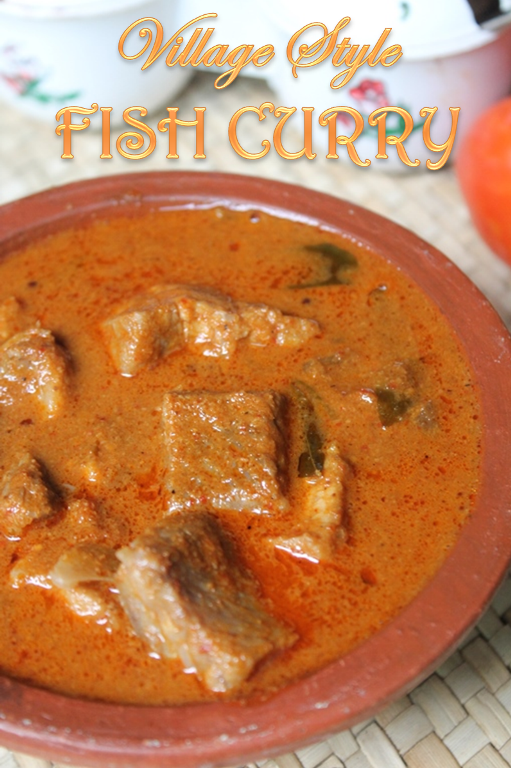

Hacks
Dry roasting spices : In a pan, add spices like coriander seeds, jeera and dry red chilli slowly roast them until a nice aroma arrives. Cool them completely before grinding. Add water and grind them into fine paste.
Wash and marinate the fish : Wash the fish with little salt or lemon juice in cold water. Rinse them 2 or 3 times to remove any dirt, blood or fish scales. Marinate fish with salt and turmeric powder.
Soaking tamarind : Soak the lemon sized tamarind in hot water for 15 minutes. Extract the pulp and discard the seeds after soaking.
Earthen clay pot : Cooking the fish curry in earthen clay pot ( manchatti ) gives the authentic taste and aroma. It also helps to retain the heat and enhances the flavour over time.
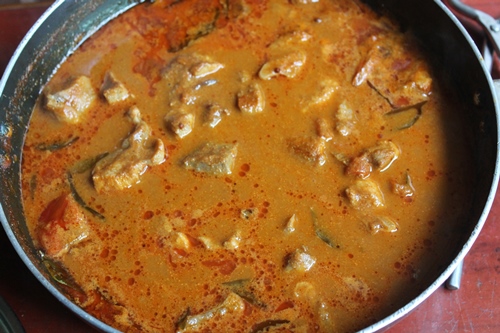

Village Fish Curry (Step by Step)
Expert Tips
- Add a handful of garlic cloves for traditional fish curry.
- Don’t stir the curry after adding the fish, it may break apart. ● You can use store bought tamarind pulp for tanginess.
- Add a pinch of jaggery at the end of cooking, which helps to balance the overall profile and elevate the taste to the next level.
- Slowly roast the aromatic spices in low flame, don’t brown it. ● Store bought canned coconut milk can also be used to achieve the body of the curry.
- Rest the kulambu at least for an hour before serving. It helps to blend all the flavours in the fish.
- Some people may add drumstick or chopped raw mango in the fish curry for unique taste and sourness.
Storage
Allow the fish curry to cool down completely before storing. Transfer the curry to an airtight container and store it in the refrigerator. It tastes even better the next day. Generally tamarind based curries have a longer shelf life, but we have added coconut in this recipe so it lasts for 2 to 3 days.
Serving
Village style fish curry is so versatile. You can serve them with hot plain rice, Kerala matta rice, brown rice, idli, dosai and ragi mudde. Serve it along with hot appalams and spicy fish fry. The fish kulambu tastes better the next day, because the flavours get beautifully into the fish. It turns out to be a finger licking meal.
FAQ
1.Can I use regular onion instead of shallots ?
You can use regular onions if you don’t get time to peel small onions. But the taste and flavour may differ. For authentic taste, try to use small onions.
2. Is it necessary to cook in a clay pot ( manchatti )?
While it is not a compulsion to cook in an earthen clay pot. You can also cook the curry heavy bottomed pan. Traditionally the earthen pots are used to retain the heat for longer and adds a unique earth flavour. It also helps the flavours blend with the fish so easily.
3. What to do if the curry is too sour ?
You can add a pinch of jaggery or sugar to reduce the sourness in the curry.
4. How do I stop fish from breaking in the curry ?
Add the fish once the base gravy is ready. Check all the flavours are completely balanced. Then slowly add the fish and stir it occasionally. These steps help to avoid fish from breaking.
Variations
Fish head curry : This is a popular dish in Singaporean and Malaysian cuisines. The recipe is prepared by cooking the fish head in tangy and spicy gravy. It is often served with bread and rice.
Goan fish curry : Goan fish curry is popular in Coastal regions of Goa. This curry is a blend of tangy, spicy and sweet flavours. They use vegetable oil or coconut oil for base and also goan red chillies which helps to achieve a bright red color gravy.
Malabar fish curry : Malabar fish curry is so popular in Kerala. The curry is flavoured with coconut oil, coconut milk and coconut paste. Kerala fish curry is generally less in spice and is a staple in Kerala households. It is traditionally served with Kerala matta rice.
More Fish Recipes
📖 Recipe Card
Village Style Fish Curry Recipe
Servings: 4 servings
Calories: 257kcal
Notes
- Add a handful of garlic cloves for traditional fish curry.
- Don’t stir the curry after adding the fish, it may break apart. ● You can use store bought tamarind pulp for tanginess.
- Add a pinch of jaggery at the end of cooking, which helps to balance the overall profile and elevate the taste to the next level.
- Slowly roast the aromatic spices in low flame, don’t brown it. ● Store bought canned coconut milk can also be used to achieve the body of the curry.
- Rest the kulambu at least for an hour before serving. It helps to blend all the flavours in the fish.
- Some people may add drumstick or chopped raw mango in the fish curry for unique taste and sourness.
Storage
Allow the fish curry to cool down completely before storing. Transfer the curry to an airtight container and store it in the refrigerator. It tastes even better the next day. Generally tamarind based curries have a longer shelf life, but we have added coconut in this recipe so it lasts for 2 to 3 days.Serving
Village style fish curry is so versatile. You can serve them with hot plain rice, Kerala matta rice, brown rice, idli, dosai and ragi mudde. Serve it along with hot appalams and spicy fish fry. The fish kulambu tastes better the next day, because the flavours get beautifully into the fish. It turns out to be a finger licking meal.Nutrition
Serving: 1servings | Calories: 257kcal | Carbohydrates: 7g | Protein: 17g | Fat: 19g | Saturated Fat: 8g | Polyunsaturated Fat: 5g | Monounsaturated Fat: 5g | Cholesterol: 38mg | Sodium: 47mg | Potassium: 429mg | Fiber: 3g | Sugar: 2g | Vitamin A: 320IU | Vitamin C: 28mg | Calcium: 43mg | Iron: 2mg
If you have any questions not covered in this post and if you need help, leave me a comment or mail me @[email protected] and I’ll help as soon as I can.
Follow me on Instagram, Facebook,Pinterest ,Youtube and Twitter for more Yummy Tummy inspiration.
IF YOU MAKE THIS RECIPE OR ANYTHING FROM YUMMY TUMMY, MAKE SURE TO POST IT AND TAG ME SO I CAN SEE ALL OF YOUR CREATIONS!! #YUMMYTUMMYAARTHI AND @YUMMYTUMMYAARTHI ON INSTAGRAM!
More Kulambu Recipes
Reader Interactions

Source link
